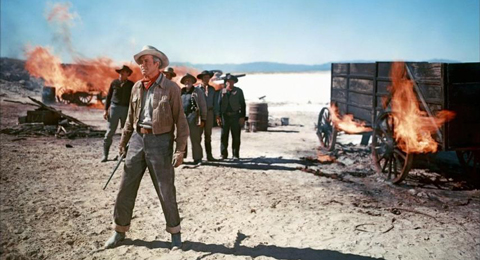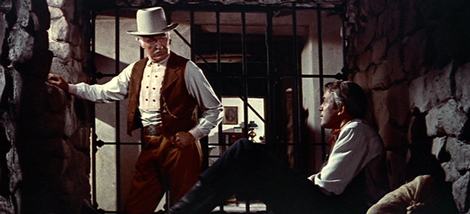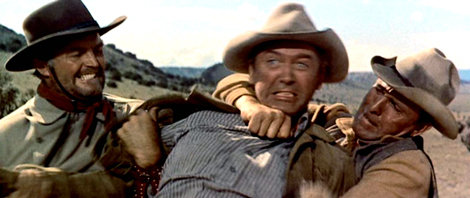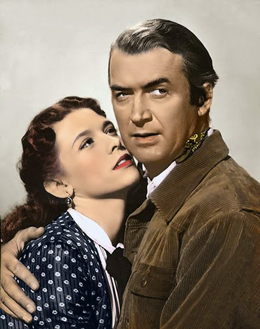Reviewed by Glenn Erickson
At film school I took great interest in the films of Anthony Mann. Jim Kitses' 1972 UCLA course on the American Western transformed the way I thought about western movies. I had already bought his book Horizons West because it had a chapter on Sam Peckinpah, and detailed a strange mutilated movie with the funny title of Major Dundee. The book also examined the films of Budd Boetticher, and a particularly interesting fellow named Anthony Mann.
At that time Anthony Mann's James Stewart westerns seemed near perfect; only later did it seem that Stewart was in charge of much of their content and tone, which grew increasingly conservative. This reportedly fit right in with the views of the country at large. But Mann's non-Stewart westerns as well as his earlier films noir were markedly non-conservative in their political attitudes. Of the westerns,
Devil's Doorway and The Furies are savage criticisms of the racist Western expansion and the depredations of big landowners seeking to form their own private kingdoms.
But those films didn't make money, and Stewart's more calculatedly consensus-affirming vehicles did. Writer Borden Chase (Red River) wrote several of them, and established the James Stewart western character, a neurotic loner with a lawless past desperate to rejoin decent society yet fearful that he'll backslide into savagery. With each movie doing better business than the last, Stewart and Mann followed the money trail from Universal-International to MGM and finally to Columbia. 1
A good all-round director, Mann made his reputation with films that for their time were ultra-violent. His fights are rough and dirty, often focusing on the threat of mutilation. The Stewart westerns took a few steps back from the excesses of Mann's film noir hits, but Stewart's characters suffered through a medical handbook's worth of physical ordeals: choked, almost drowned, his hands given severe rope burns, etc.

The final Mann / Stewart western is 1955's The Man from Laramie, a formally impressive show that indulges Mann's penchant for classical themes. In an elemental, lawless landscape, a ghostlike outsider uncovers secrets that put an end to a corrupt ranching dynasty.
Will Lockhart (James Stewart) is searching for the man who sold rifles to the Indians that killed his brother, a U.S. Cavalryman. He tries to raise some cash by hauling salt from the flats outside of the town of Coronado, but the psychotic Dave Waggoman (Alex Nicol) comes along with a dozen riders and accuses him of trespassing on his family's vast ranch, called The Barb. Lockhart apologizes but gets dragged through a campfire. His wagons are burned and his mules shot. In town, he learns the score from the storekeeper Barbara Waggoman (Kathy O'Donnell) and spinster rancher Kate Canady (Aline McMahon): Crazy Dave is the son of the autocratic rancher Alec Waggoman (Donald Crisp), whose vast spread is really run by foreman Vic Hansbro (Arthur Kennedy). Everyone wants Lockhart to leave town: Vic brawls with him, wandering ne'er-do-well Chris Bolt (Jack Elam) tries to knife him and Alec Waggoman attempts to buy him off. Nearly blind, Alec has a recurring dream that a stranger will arrive to shoot his beloved son. Beaten up and thrown in jail, Lockhart must undergo a terrible ordeal before he discovers the identity of the gun smuggler.
The Man from Laramie manages to be simultaneously conventional and boldly unusual. In film school Steve Sharon and I made up our own lyrics for the gloppy title song, sung low and slow:
"The Man from Laaaar a meeeee / He was a nice guy but they burned his wagons and shot his mules and didn't treat him very wehhh -- elll..."

The Stewart Factor shows up in a couple of statements that remind us that Stewart and Mann had just finished Strategic Air Command, a propaganda picture for America's Brave New jets 'n' nukes foreign policy defense program. Will Lockhart assures Kate Canady that 'the Army is a mighty fine place for a young man', and snaps back with a statement that in a showdown between the Cavalry and Indians, the U.S. Cavalry would never shoot first. That's as about as far from Devil's Doorway as a western can get; we keep waiting for Lockhart to hand out recruiting flyers. Interestingly, Will Lockhart breaks from the mold of Stewart's earlier obsessed cowboy characters. Will is motivated by his brother's killing but not unbalanced by it; and whenever he loses his cool it's because of an immediate threat or trauma.
The film allows Anthony Mann to indulge his druthers as well, especially his passion for classical allusions. Laramie reminds very strongly of King Lear mixed with Greek tragedy -- the ill-fated inheritance, bitter feuds and a broken romance that has stretched across decades. The proud patriarch goes literally blind after years of turning a blind eye to the shortcomings of his only heir, and cursed nightmares foretell the coming of a killer who will drag his empire down into the dust. That the film works so well with this classical baggage is a testament to Mann's skill, Phillip Yordan and Frank Burt's fine dialogue and the actors that breathe life into the characters. Donald Crisp is unusually forceful, especially this late in his career. Alex Nicol is memorable as an infantile psycho with a six-gun, who comes across like Aldo Ray's evil twin. Arthur Kennedy was especially good in Bend of the River, and in this show makes his character's bitterness and frustration seem very real and sympathetic. As is usual, the villain provides the moral complexity lacking in Stewart's character.
Stewart's fine acting and Mann's superior direction transform situations and characters that on paper sound pretty lame: the mysterious stranger come to town on a personal quest; the prim heroine; the Ponderosa-sized ranch; the loyal sidekick & the scurvy backstabber (Wallace Ford & Jack Elam). Mann elevates the mythic elements with a visual flair that would serve him well in his later epics: El Cid, The Fall of the Roman Empire, even The Heroes of Telemark. Will and Vic roll in the dust as they fight, between the hooves of frightened horses. Menacing riders appear as tiny dots on the horizon, and turn out to be 'royal retainers' that stand watch as the sadistic Crazy Dave slaughters ten mules just to amuse himself. In a confrontation that prefigures El Cid's dynamic jousting duel to the death, Will Lockhart squares off against the mounted, charging Alec Waggoman. It's an absurd attack by a nearly blind man.

In one of Mann's most brutal and traumatic scenes, a frantic, writhing Lockhart is held fast, his hand outstretched so that the insane Dave Waggoman can shoot a hole through it. To us sheltered '50s boomer kids with no knowledge of the horrors of torture, this was a shocking scene. Nobody ever mentioned that shooting someone in the hand with a .45 pistol would almost certainly blow away several fingers; Taxi Driver replayed such a scene in graphic detail.
One interesting angle that satisfies both Stewart's 'family' reputation and Mann's yen for classical extremes is the fact that Will Lockhart doesn't actually kill anybody, but instead serves as the catalyst-provocateur for the Waggoman clan to destroy itself. Formally speaking, that makes Lockhart a spiritual brother to Lee Marvin's 'Walker' in John Boorman's Antonioni-fied, spaced-out gangster epic Point Blank. Mann's affinity for genre grit made his Westerns as edgy and sadistic as mainstream movies were allowed to be in 1955.
The Man from Laramie carries its share of conventional '50s attitudes. The West could be a paradise if it weren't for the aberrant actions of 'a few bad apples,' to borrow the simpleton's moral that bogs down Bend of the River. Laramie also exhibits a rather retro attitude toward Native Americans. Lockhart doesn't disguise his contempt for the Indian who works in Barbara's general store. Dialogue establishes that the big landowner Waggoman bought his ranch from the Apache tribe. Did anything like that ever happen before the 20th century? It sounds like exposition planted to undercut any possible sympathy for the Apache. Likewise the supremacy of patriarchal authority is taken for granted. Spurned lover Kate Canady has been ignored and insulted by Alec Waggoman for 4/5 of her lifetime, yet when he cries for help from his sickbed she responds with a subservience that would shame a dog: "He needs me!" The Barb's cowhands obey every order they're given by the Waggoman princes, no matter how wrong or sick-minded; it's a feudal simplification that apparently isn't supposed to remind us of the Nuremberg trials.

Anthony Mann was set to make Night Passage with Stewart, but dropped out over differences, or perhaps a better offer from the Mirisch Corporation came along. It's interesting that Night Passage looks like an Anthony Mann project that 'went soft' in all departments. Stewart in particular seems out of control, stuffing the show with 'family values' speeches and giving himself a cute musical instrument to play. The ruthless central storyline is almost elbowed off the screen.
Mann's final non-epic western instead became the visionary Man of the West (1958). It's as if the director needed to vent all the dark demons he'd been suppressing after six years working almost exclusively with James Stewart. In Man of the West the landscape is transformed for the first time into a place that Sergio Leone and Sam Peckinpah would call home. Writer Reginald Rose's tortured heroes and insane villains struggle in an appropriately corrupt, barren frontier of ghost towns and inbred evil, where meaningless killing and rape are everyday events. As could be expected, it was both way ahead of its time and a big flop at the box office. Who wanted to see Gary Cooper as a frustrated loser being pushed around by creepy bad guys?
The Twilight Time Blu-ray of The Man from Laramie is a real beauty. Sony's restoration department has done wonders with the original elements, bringing out the beautiful hues of Charles Lang's cinematography. We're told that this is the first time the film has been transferred at its full screen width of 2.55:1, the anamorphic ratio for early CinemaScope. Mann and Lang hold a decent depth of field in the interiors. Their expressive compositions are free of the 'line them up and don't anybody get close to the camera' philosophy of early 'Scope.
I don't know if the film was originally released in stereo, but TT's disc has a 5.1 mix. An Isolated Music and Effects Track carries George Duning's serviceable score. The disc is a huge improvement over the Columbia Tri-Star DVD release of 2000.

The other extras are a brief anamorphic teaser pushing the CinemaScope angle. The full-length trailer begins with James Stewart talking to us from his folding chair on location, and contains every moment of the star punching people or shooting guns, John Wayne- style.
Julie Kirgo's insert liner notes bring out the finer points of Anthony Mann's classical story structure, and of the persona Stewart adopted to stay atop the Hollywood anthill in the competitive 1950s. The choice of cover photos expresses the 'man of mystery' that the script says Will Lockhart is supposed to be. I will wager that most audiences ignored that angle of the story, waiting for good old wholesome Jimmy to reassert himself for the fade out. Not only does Lockhart prevail, he's revealed to have been an Army Captain all along. Was he really avenging his brother, or just a secret agent on Army business? Audiences don't mind that Lockhart is both things, which makes The Man from Laramie fairly disturbing.
On a scale of Excellent, Good, Fair, and Poor,
The Man From Laramie rates:
Movie: Excellent
Video: Excellent
Sound: Excellent
Supplements: Isloated Score Track, Teaser, Trailer, Julie Kirgo liner notes.
Deaf and Hearing Impaired Friendly?
YES; Subtitles: English
Packaging: Keep case
Reviewed: June 16, 2014
Footnote:
1. Stewart's personal fortunes became very successful thanks to a financial coup by agent Lew Wasserman. He negotiated a sizeable chunk of the profits for the first Stewart-Mann collaboration Winchester '73, an excellent picture that became the most successful Western made to date. It changed the way Hollywood worked, shifting power from studios to agent 'packagers' and their stables of stars eager to finally be paid what they were worth.
Return

Text © Copyright 2014 Glenn Erickson
See more exclusive reviews on the Savant Main Page.
Reviews on the Savant main site have additional credits information and are often updated and annotated with reader input and graphics.
T'was Ever Thus.
Return to Top of Page
|

